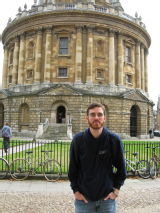Bradley Pardue - Andrew W Mellon Foundation Research Fellowship 2009
Spaces of the Past: Spaces, Belief and Communities in the Early Modern World
I would like to begin by thanking Warwick’s Centre for the Study of the Renaissance, the Newberry Library’s Center for Renaissance Studies, and the Andrew W. Mellon Foundation for the opportunity to serve as a visiting research fellow for the last two months. This fellowship has provided me with both the time and resources to focus on revising and refining my Ph.D. dissertation, entitled “‘[A] litle treatyse in prynte and euen in the english tongue’: Appeals to the Public during the Early Years of the English Reformation,” particularly as it engages the theme of “Spaces of the Past: Spaces, Communities and Belief in the Early Modern Period.”
I have found the questions posed by the Warwick/Newberry initiative regarding the nature of early modern communities extremely thought provoking in the development of my own research, which focuses on William Tyndale and other English religious exiles in the 1520s and 1530s. Tyndale and his associates were members of an intimate though at times divided exiled community on the Continent, as well as being the intellectual leaders of a broader evangelical movement for reform back in England. While the community he addressed was largely textually-mediated, Tyndale’s ecclesiology imagines reformed local congregations of believers and grapples with the complications resulting from the fact that the church bridged the divide between the spiritual and secular spheres. Meanwhile, his soteriology explores the nature of election and thus inclusion in the true church (“a spiritualle thynge and no exteryor thynge but invisible from carnalle yies”), an idea obviously in tension with a conception of the church as the members of a local parish. My dissertation explores these complexities of Tyndale’s thought in greater detail, and I have had the opportunity to share some of my conclusions in a paper at Warwick’s STVDIO Seminar, sponsored by the Humanities Research Center.
As with Tyndale’s endeavors as a translator and writer, the work of the modern academic is often a solitary affair mediated largely by the production, distribution, and reading of texts. Fortunately, my time at Warwick has allowed me to meet face-to-face with several scholars whose books I have long admired and to participate in a welcoming intellectual community of professors and fellow students from a variety of departments. In particular, I would like to thank Peter Marshall from the History Department for meeting with me on several occasions to discuss my project and for reading and commenting upon the entire draft of the dissertation, despite the fact that he was officially on leave this term. I also received helpful feedback from my well-attended STVDIO talk on November 3, entitled “‘[T]he very brest of all this batayle’: Church, Clergy, and Laity in the Conflicting Ecclesiologies of William Tyndale and Thomas More,” and from individual meetings with others during my time here.
In addition to the personal contacts I have made, I have also benefited from my easy access to the extensive collections at the Bodleian Library at Oxford University and the British Library in London. During my various research trips to these libraries, I have been able to examine a range of texts related to my project that I would otherwise have had to consult indirectly through modern editions or, where possible, online. As my work deals with early modern print culture, the opportunity to read and to examine sixteenth-century books directly has contributed to my understanding of the experience of reading of those whom I study. While working on revisions to my dissertation, I have also found the collection of secondary literature in my field in Warwick’s library quite helpful.
In addition to consulting sources relating to my dissertation, I have also used my time here at Warwick to begin research on my next project, which will focus on the topic of Christian mortalism, the belief held by several prominent early sixteenth-century reformers that the souls of the departed are either annihilated or sleep between death and the General Resurrection/Last Judgment. While some scholarly literature on mortalism exists for the seventeenth century, there is still a lot of work to be done on the topic during the opening years of the Reformation. This neglected theme also provides a new lens through which to examine a range of issues including eschatology and soteriology, beliefs about Purgatory, biblical exegesis, Christian anthropology, and the incorporation of Jewish and Greek thought into theology.
My association with the Warwick-Newberry Collaborative Programme, first in July 2008 as a participant in the Summer Residential Workshop on Belief and Unbelief, and now in the Fall of 2009 as a Visiting Research Fellow, has broadened and deepened my intellectual outlook by allowing me to exchange ideas with scholars from a variety of different disciplines and national backgrounds. I have also formed relationships with institutions and with both established and up-and-coming scholars that will continue to aid me as my own academic career progresses. As I apply and interview for academic positions in the coming months, I also believe that my experience as a Warwick/Newberry fellow will set me apart in this competitive job market.
In closing, I would like to thank particularly Dr. Ingrid De Smet and Ms. Jayne Brown at the Centre for the Study of the Renaissance for their ongoing help with all the practical logistical issues involved in preparing for my trip and for making it possible for my time here at Warwick to go so smoothly.
Brad Pardue
University of Tennessee

